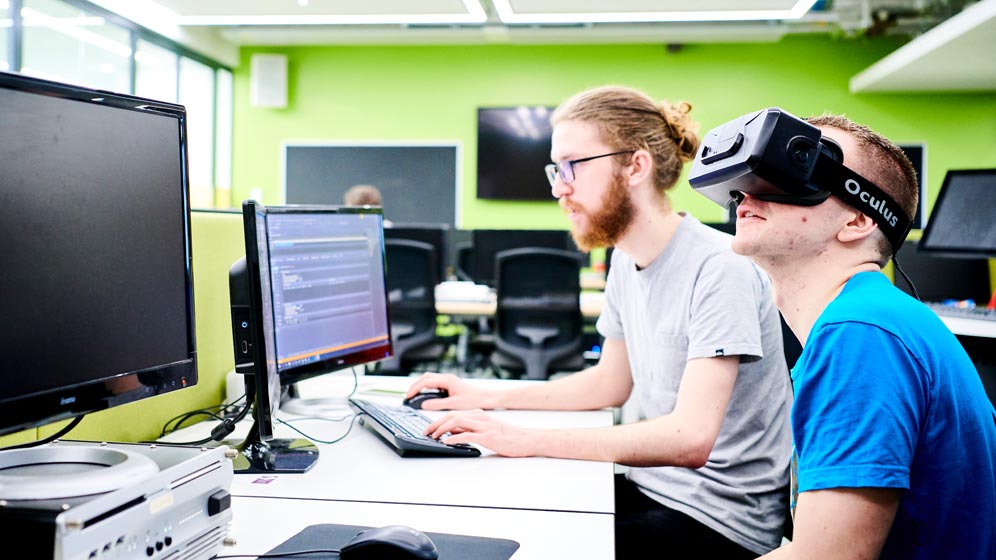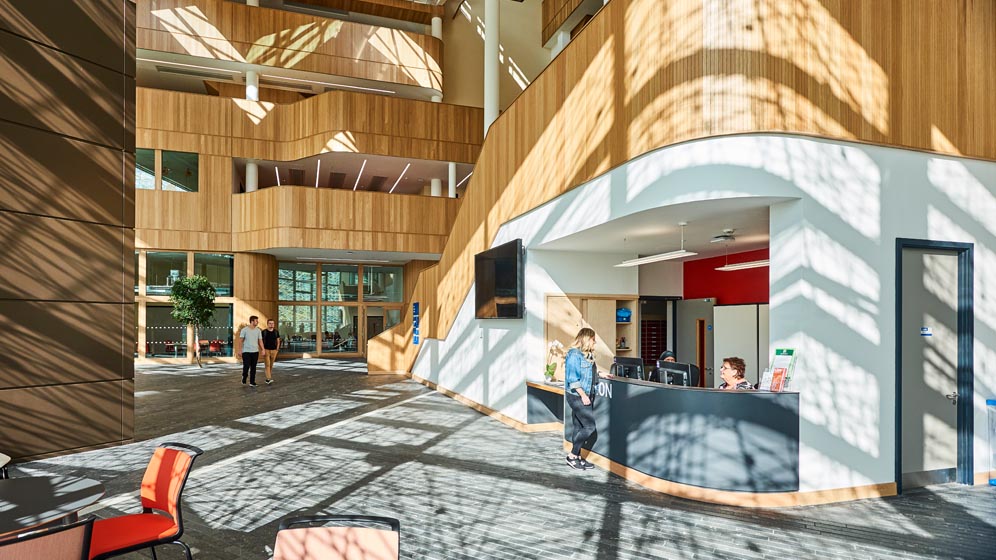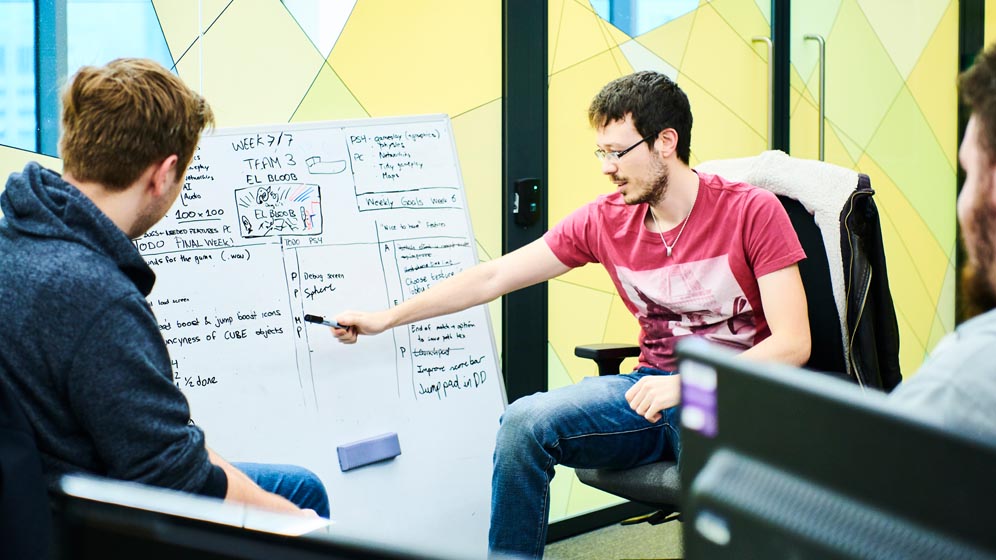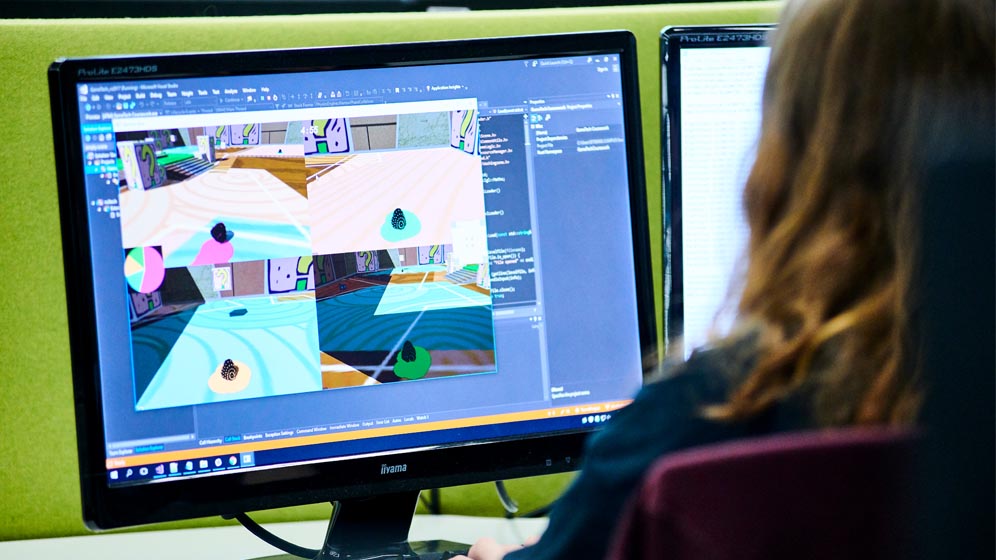Computer Science (Cyber Security) BSc Honours
- UCAS code: I195
- Full time
- 3 years
Learn about the dynamic world of Cyber Security. You’ll develop robust systems that are secure against cyber threats.
You are currently viewing course information for entry year: 2026
Next start date:
- September 2026
UCAS Institution name and code:
- NEWC / N21
Course overview
In today's interconnected world, cybersecurity is more critical than ever. Cyber threats are rising, highlighting the need to safeguard our digital infrastructure. Our Cyber Security degree gives you the skills to defend against evolving threats. You'll develop the skills and knowledge to develop dependable and secure software systems.
You’ll focus on designing and developing secure software systems. You'll learn theory and techniques used to make systems resilient against cybersecurity threats. You'll learn about:
- security mechanisms for computing
- software verification techniques and tools
- cryptography and cryptographic protocols
- network and system security
In your first two years, you'll study a broad Computer Science curriculum. You’ll learn about creative problem-solving, program design and implementation.
In your final year, you’ll learn more about Cyber Security and study more specialised modules.
You'll also have the option to take part in a paid industry placement or study abroad year.
The latest research drives our teaching, keeping your course future-focused. We are:
- an Academic Centres of Excellence in Cyber Security Research
- recognised by the UK's National Cyber Security Centre for conducting leading research
- the lead institution for the National Edge AI Hub, which explores the impact of cyber threats on Edge AI
Sorry, you need JavaScript to view this video
Your course and study experience - disclaimers and terms and conditions
Please rest assured we make all reasonable efforts to provide you with the programmes, services and facilities described. However, it may be necessary to make changes due to significant disruption, for example in response to Covid-19.
View our Academic experience page, which gives information about your Newcastle University study experience for the academic year 2025-26.
See our terms and conditions and student complaints information, which gives details of circumstances that may lead to changes to programmes, modules or University services.
Additional information
Flexible degree structure
All our Computer Science students study the same modules for the first two years. Once you have a good foundation, you'll specialise later in your course. This means you can transfer between our degrees, until the end of your second year.
Quality and ranking
Professional accreditation and recognition
All professional accreditations are reviewed regularly by their professional body.
Modules and learning
Modules
The information below is intended to provide an example of what you will study.
Most degrees are divided into stages. Each stage lasts for one academic year, and you'll complete modules totalling 120 credits by the end of each stage.
Our teaching is informed by research. Course content may change periodically to reflect developments in the discipline, the requirements of external bodies and partners, and student feedback.
Optional module availability
Student demand for optional modules may affect availability.
Full details of the modules on offer will be published through the Programme Regulations and Specifications ahead of each academic year. This usually happens in May.
To find out more please see our terms and conditions
Learn about the fundamentals of Computer Science. There’s an emphasis on developing your skills in program design and implementation.
You'll get experience in Java and Python programming, develop your problem-solving skills, and get a broad view of hardware and software architectures.
During this year, you’ll get an insight into what it’s like working in the digital sector.
Modules
| Compulsory Modules | Credits |
|---|---|
| Fundamentals of Computing | 20 |
| Computer Systems Design and Architectures | 20 |
| Foundations of Data Science | 20 |
| Programming Portfolio 1 | 30 |
| Programming Portfolio 2 | 30 |
You'll study modules in software engineering, algorithm design, security programming and the fundamental principles that govern the operation of the internet.
We'll introduce you to requirements analysis and databases, and the formal specification of software systems.
You'll also work in a team to engineer a substantial software product, developing practical teamwork skills.
Modules
| Compulsory Modules | Credits |
|---|---|
| Security Programming | 20 |
| Algorithm Design and Analysis | 10 |
| Software Engineering Team Project | 30 |
| Introducing Contemporary Topics in Computing | 30 |
| Software Systems Design and Implementation | 30 |
In your final year, you’ll start to specialise in Cyber Security. You'll study system and network security, software verification technology, reliability and fault tolerance, and cryptographies.
You'll also complete a dissertation project in an area of your choice, supervised by an expert in Cyber Security. For this, you’ll need to research and plan a solution to a real-world Cyber Security problem.
Modules
| Compulsory Modules | Credits |
|---|---|
| Major Project and Dissertation in Computer Science | 60 |
| Cryptography | 10 |
| System and Network Security | 20 |
We base these figures and graphs on the most up-to-date information available to us. They are based on the modules chosen by our students in 2024-25.
Teaching time is made up of:
- scheduled learning and teaching activities. These are timetabled activities with a member of staff present.
- structured guided learning. These are activities developed by staff to support engagement with module learning. Students or groups of students undertake these activities without direct staff participation or supervision
Teaching and assessment
Teaching methods
Teaching methods include:
- lectures, including guest lectures from visiting professionals
- tutorials from our expert staff
- supervised practical work, which will account for most of your time
- project work to help you develop real-world business skills, such as teamwork and project management
During your project work in Stage 2, you'll work as a team to develop a software product.
In Stage 3, you'll work on a major individual project and a dissertation.
Assessment methods
You'll be assessed through a combination of:
-
Coursework
-
Dissertation or research project
-
Examinations – practical or online
-
Group work
-
Practical sessions
-
Presentations
-
Projects
Skills and experience
Practical skills
You’ll have lectures, tutorials and practical sessions. During practical sessions, PhD students or research staff will support you.
You'll explore tools and techniques to support software development, focussing on teamwork. You'll apply theoretical analysis to solve problems. The effective communication skills you'll develop will prepare you for employment.
Industry speakers will offer valuable insights, sharing their career experiences and professional expertise.
Business skills
Employers look for evidence of skills and experience, as well as your academic work. This degree has been created with industry needs in mind. The course meets high professional and educational standards required by our accrediting body, the British Computing Society (BSC).
In Stage 2, you'll work in a team environment with real-life industry briefs, giving you a preview into industry life. You will pick a problem, identified by industry, and develop a project to find a solution. Industry representatives, lecturers and the project sponsor mark the projects.
You'll develop non-technical skills essential for a career in computer science, such as:
- planning
- time management
- organisation
- teamwork and understanding your role in a team
- creative problem solving
- communication
- adaptability
Research skills
You’ll benefit from our teaching approach informed by research. Each module incorporates the latest research and expertise from our academic staff.
Through the group and individual projects, you'll develop your own research skills by:
- exploring your ideas
- experimenting with recognised and emerging technologies
- finding innovative solutions to real-world problems
You'll investigate existing work, identify the best approaches, and apply the right techniques for the task. You'll present your findings with clarity and evidence, refining your communication skills.
You'll graduate with the skills needed for a research career in academia or industry.
Student stories
Charlotte, a British student, tells us about her placement at Jaguar Land Rover, her summer internship at Deloitte and more about her course and life in Newcastle.

Opportunities
Study abroad
Experience life in another country by choosing to study abroad as part of your degree. You’ll be encouraged to embrace fun and challenging experiences, make connections with new communities and graduate as a globally aware professional, ready for your future.
You can choose to spend up to a year studying at a partner institution overseas.
If you choose to study abroad, it will extend your degree by a year.
Short-term global opportunities
During your degree, you can get involved in short-term global opportunities with activities ranging from four days to more than eight weeks. Our students have recently taken part in:
- South Korea: First Steps in Programming a Humanoid AI Robot at Seoul National University
- Hong Kong: HKUST International Summer Exchange Program, Summer 2024, at The Hong Kong University of Science and Technology
- Denmark: Business Intelligence from Web Data Analytics and Data Mining at Aarhus University
- Japan: Absolute Internship
- Peru: EcoSwell
- Singapore: Global Impact Start Up Challenge at Singapore University of Social Sciences
Funding is available to support our students who want to take part.
Industry placement in computing
You can apply to spend 9 to 12 months on an accredited and paid industry placement during your degree. You’ll get University support from our dedicated team.
Your placement is a great opportunity to gain practical experience, key business skills and industry contacts. This practical experience can help you develop outside of university.
Your placement can be in the UK or abroad. And it'll take place between Stages 2 and 3.
Recent computing industrial placements include:
- IT Intern within Consumer Products, Games and Publishing at The Walt Disney Company
- Developer / Data Science Internship at Siemens
- Engineering and Technology Intern at Rolls Royce
- Data Analyst at Bank of England
- Junior Information Analyst at NHS
Facilities and environment
Facilities
You'll be part of the School of Computing, based in the Urban Sciences Building on our Newcastle Helix campus.
This brand new £58m building offers great facilities for our students, including:
- cyber-physical systems laboratory
- decision theatre for data visualisation
- flat floor teaching facilities
- 315 PCs with a Raspberry Pi3 on every desk
The building and the surrounding area is becoming a living laboratory, underpinning research to make urban centres more sustainable for future generations.
The Newcastle Helix is an innovation district in the heart of Newcastle-upon-Tyne.
Research across the Newcastle Helix focuses on:
- cyber-physical systems
- infrastructure
- smart grids
- future of our city
- big data
Wellbeing spaces
Wellbeing and inclusivity are at the heart of our School. The USB has several wellbeing spaces for students, including:
- The Retreat: A sensory space with relaxing stimuli to distract from busy student life.
- Prayer room: For all faiths and none, this space can be used for prayer or quiet reflection.
Support
We take your health and wellbeing seriously and are committed to supporting you throughout your studies so you can fulfil your potential at university. This support includes:
- a personal tutor who is an academic member of staff who can help you with academic and personal issues throughout your degree
- a peer mentor scheme which pairs you with a current student from your course to help you navigate your first year at university
- a staff-student committee, to give you an opportunity to have a say in how your degree works
- Student Wellbeing Advisors who can offer comprehensive listening and support and signpost you to other University support services or external support agencies
- dedicated wellbeing facilities and regular activities
Your future
Join a network of successful graduates
This degree will prepare you for a career in different technical roles in a range of industries. You’ll be able to work in software houses, with companies designing and deploying dependable software in safety-critical industry sectors such as intelligence, government and consultancies.
Previous graduates have gone into these roles within 15 months of graduating:
- Cyber Security Analyst at Meaius Cyber
- Graduate Software Engineer at BAE Systems
- Software Developer at Scott Logic
- Tech Associate at Infosys
- Software Engineer at IBM
- Graduate Engineer: Artificial Intelligence
- Data Science at Roke Manor Research
Further study
This degree provides a pathway into Master's and PhD level study in a wide range of fields, depending on your choice of optional modules.
As a Computer Science (Cyber Security) BSc graduate, you can focus on advanced research in areas such as:
- artificial intelligence and machine learning for security
- network defence
- cryptography
- digital forensics
- secure software engineering
Your expertise in Cyber Security will open doors to cutting-edge research and innovation in these and many other fields.
Preparing you for career success
In the present job market, computing science graduates are better placed than many others to obtain employment in a challenging and fulfilling career, and the employability of Newcastle graduates is particularly high.
An increasing number of employers require digital skills, meaning our graduates are highly sought after. They move into bespoke software development roles in software houses and computer manufacturers and also into corporate organisations that use computers on a larger scale, such as banking, insurance and manufacturing companies and public sector institutions.
Benefit from strong industry links
You'll also benefit from our well-established links with organisations within the industry. Our placement students and graduates are regularly recruited by companies such as:
- Nissan
- Waterstons
- Accenture
- IBM
- P&G
- Deloitte
- Microsoft
- Sage
- DWP
- GCHQ
You can also gain work experience with local businesses. Many local businesses approach our School to advertise short, part-time or voluntary work opportunities.
Sorry, you need JavaScript to view this video
Careers support
We want all our students to succeed in their careers. That’s why we’ve designed our courses to give you the skills employers are looking for. You can also go to guest lectures from industry professionals, mock interviews, and professional skills workshops.
Every year, the school hosts a week of career events. In the past, these have included:
- hackathon workshops
- placement discussions
- coding and enterprise challenges
- employer talks
- networking events
Our Careers Service is one of the largest and best in the country, and we have strong links with employers. We provide an extensive range of opportunities to all students through our ncl+ initiative.
Visit our Careers Service website
Recognition of professional qualifications outside of the UK
If you’re studying an accredited degree and thinking about working in Europe after you graduate, the best place to find current information is the UK Government’s guidance on recognition of UK professional qualifications in EU member states. This official resource explains whether your profession is regulated in another country, what steps you need to take, and which organisation you should contact.
Entry requirements
All candidates are considered on an individual basis and we accept a broad range of qualifications.
The entrance requirements and offers below apply to 2026 entry.
| A-Level | |
|---|---|
| International Baccalaureate | |
|---|---|
Other UK and the Republic of Ireland qualifications
Alternative offers at Newcastle
Through one of our contextual or alternative offer routes, you could receive an offer of up to three grades lower than the typical requirements.
Contextual offers
We use certain contextual data from your UCAS form, alongside your application, to consider challenges that you may have faced in your education and the potential effect this may have had on your qualifications. This means you may be eligible to receive a lower contextual offer.
PARTNERS offers
One of the largest and longest support entry routes to university of its kind for students from underrepresented backgrounds. We support applicants from application through to study.
Realising Opportunities offers
A unique programme delivered in collaboration with 10 leading, research-intensive universities in the UK. The programme is open to students in Year 12/first year of college.
Pathways to Newcastle offers
Pathways to Newcastle, our national skills entry route, is available for specific subject areas.
High Performance Athletes
We support promising athletes at the application stage, who compete in regional, national or international levels in their sport.
Qualifications from outside the UK
English Language requirements
Entrance courses (INTO)
International Pathway courses are specialist programmes designed for international students who want to study in the UK. We provide a range of study options for international students in partnership with INTO.
These courses are specifically designed for international students who want to study in the UK and progress onto one of our undergraduate degrees. Our International Study Centre, has a range of study options including:
- International Foundation
- International Year One
- English Language courses
Find out more about International Pathway courses
Admissions policy
This policy applies to all undergraduate and postgraduate admissions at Newcastle University. It is intended to provide information about our admissions policies and procedures to applicants and potential applicants, to their advisors and family members, and to staff of the University.
University Admissions Policy and related policies and procedures
Credit transfer and Recognition of Prior Learning
Recognition of Prior Learning (RPL) can allow you to convert existing relevant university-level knowledge, skills and experience into credits towards a qualification. Find out more about the RPL policy which may apply to this course.
Tuition fees and scholarships
Tuition fees for academic year 2026-2027
The 2026 entry home fees have not yet been confirmed.
| Qualification: BSc Honours | |
|---|---|
|
Home students full time 3 years |
Tuition fees (Year 1)
Not set |
|
International students full time 3 years |
Tuition fees (Year 1)
30,300 |
Year abroad and additional costs
For programmes where you can spend a year on a work placement or studying abroad, you will receive a significant fee reduction for that year.
Some of our degrees involve additional costs which are not covered by your tuition fees.
Scholarships
Find out more about:
Open days and events
You'll have a number of opportunities to meet us throughout the year at our on-campus and virtual open days.
You'll be able to:
- explore our beautiful campus
- find out about our vibrant city
- discover what students think about studying at Newcastle
You'll also have the opportunity to speak to academic staff and find out more about the subjects you're interested in.
Find out about how you can visit Newcastle in person and virtually.
We regularly travel overseas to meet with students interested in studying at Newcastle University. Visit our events calendar to find out when we're visiting your region.
How to apply
Apply through UCAS
To apply for undergraduate study at Newcastle University, you must use the online application system managed by the Universities and Colleges Admissions Service (UCAS). All UK schools and colleges, and a small number of EU and international establishments, are registered with UCAS. You will need:
- the UCAS name and institution codes for Newcastle University (NEWC/N21)
- the UCAS code for the course you want to apply for
- the UCAS 'buzzword' for your school or college
If you are applying independently, or are applying from a school or college which is not registered to manage applications, you will still use the Apply system. You will not need a buzzword.
Apply through UCASApply through an agent
International students often apply to us through an agent. Have a look at our recommended agents and get in touch with them.
Get in touch
By phone
Call us on +44 (0) 191 208 3333 and press option 1. Our opening hours are Monday to Friday 10am until 4pm.
Live chat
Our NCL chatbot might be able to give you an answer straight away. If not, it’ll direct you to someone who can help.
You'll find our NCL chatbot in the bottom right of this page.
Online
Chat to our students
Choosing a university is a big decision. If you've got questions about a particular course, student life or the city of Newcastle, why not chat to our friendly students or graduates!
Keep updated
We regularly send email updates and extra information about the University.
Receive regular updates by email





















